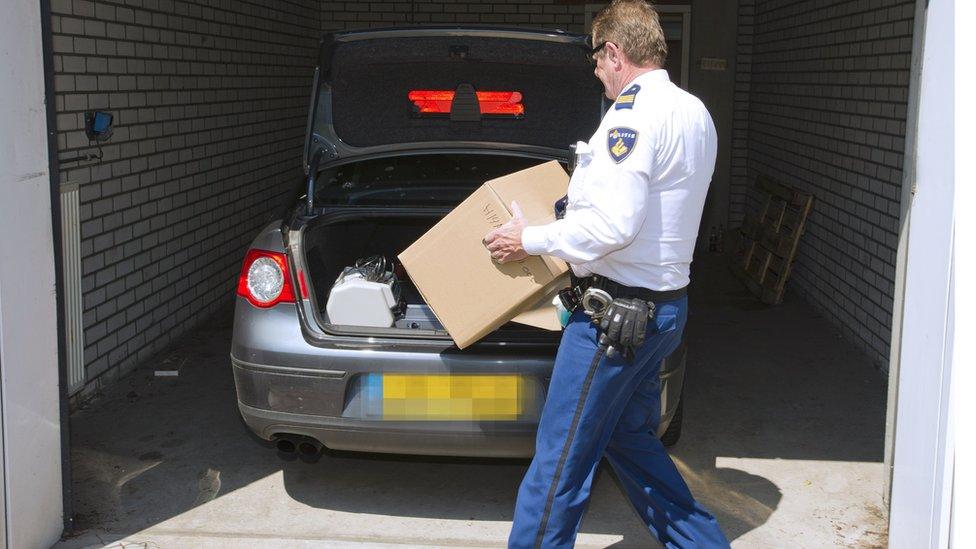Astrid Holleeder: Why I betrayed my crime boss brother
- Published
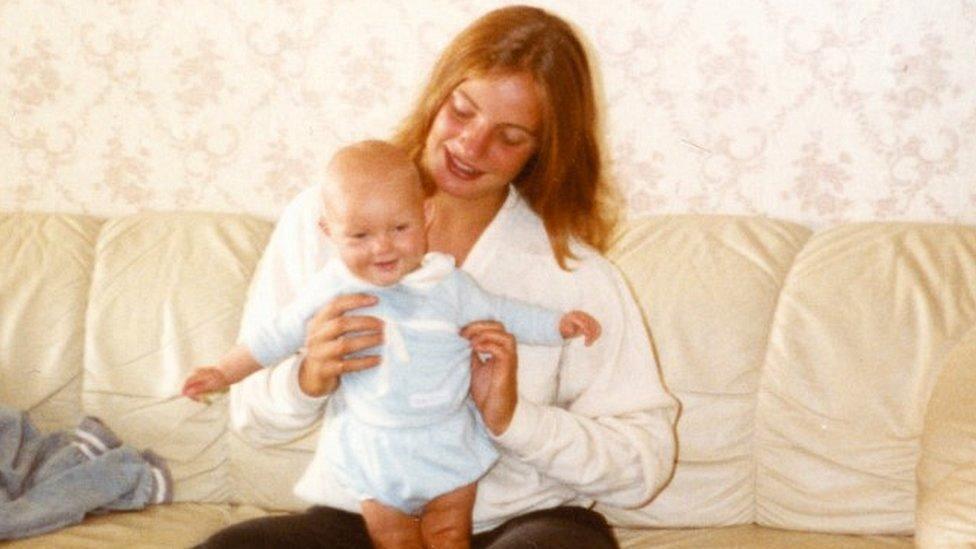
No recent picture of Astrid Holleeder is available, but here she is holding her niece in 1983
Astrid Holleeder meets strangers rarely, always in secret.
You won't find any photos of her on the internet, but she is one of the best-known women in the Netherlands.
Her brother is the Netherlands' most notorious gangster, Willem Holleeder, and she is convinced he wants her dead.
Astrid, 52, turned star prosecution witness in his ongoing multiple murder trial. She has been in hiding ever since.
Her decision to wear a wire and secretly record their most intimate conversations to secure evidence forced her to give up a successful career as a criminal defence lawyer.
Her deeply disturbing autobiography, chronicling her traumatic life, has become a bestseller.
But Astrid Holleeder is effectively invisible.
She sleeps in safe houses and drives a bullet-proof car. She owns a drawer full of prosthetic noses and teeth.
When she ventures out in public, it is often in disguise. She whips out her phone to show me a picture of her dressed as a man.
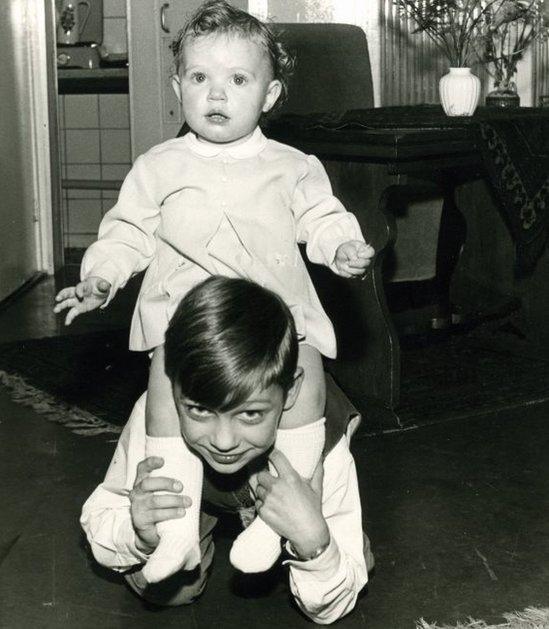
Astrid, here aged 2, grew up seeing Willem as her hero

"I know he wants to kill me and I don't blame him for it. In a day there are many moments someone can be there and shoot you. It's always there. I really feel a Judas. I betrayed him."
A play and a TV series from her book are planned, but her brother has condemned the account as a pack of lies.
In exposing her elder brother, Astrid realises she made enemies of his loyal admirers too.
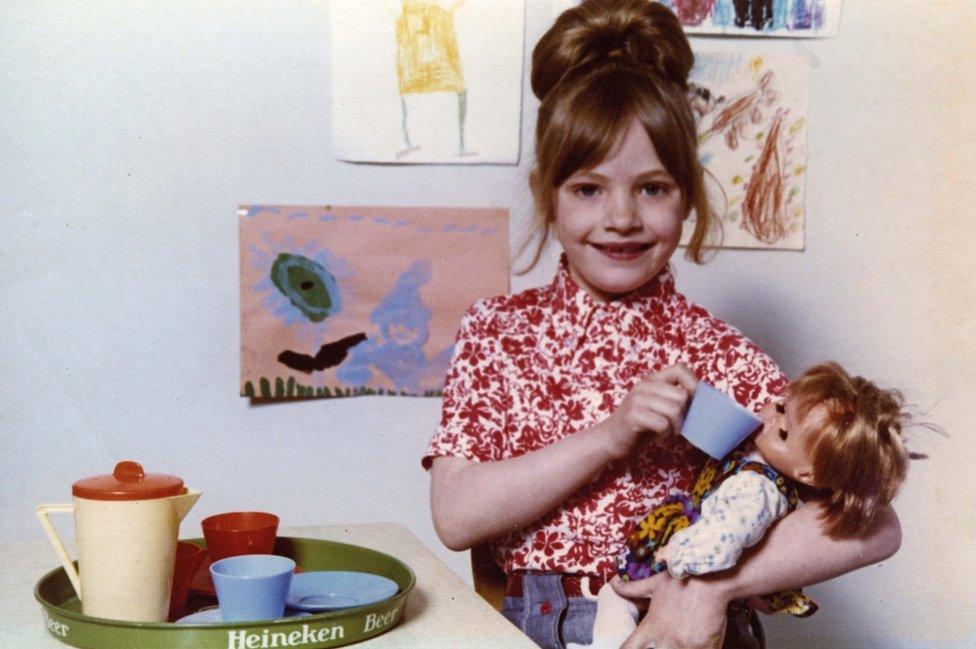
Astrid Holleeder remembers a childhood tormented by a father obsessed by the Heineken brewery he worked for
"Even if he claims he doesn't want me to die anymore, so many people would do it just to impress him."
A family 'drenched in Heineken'
Her brother was once her hero too.
"He was like this great, strong, figure so different to our own father. I felt a lot of respect for him. He always had money in his pocket, drove big cars, always had nice girlfriends."
Their bond was partly forged by fear of their brutal, alcoholic father. He tormented the children and beat up their mother.
Their father worked for Amsterdam's Heineken brewery and Astrid talks of the family's life as "drenched in Heineken".
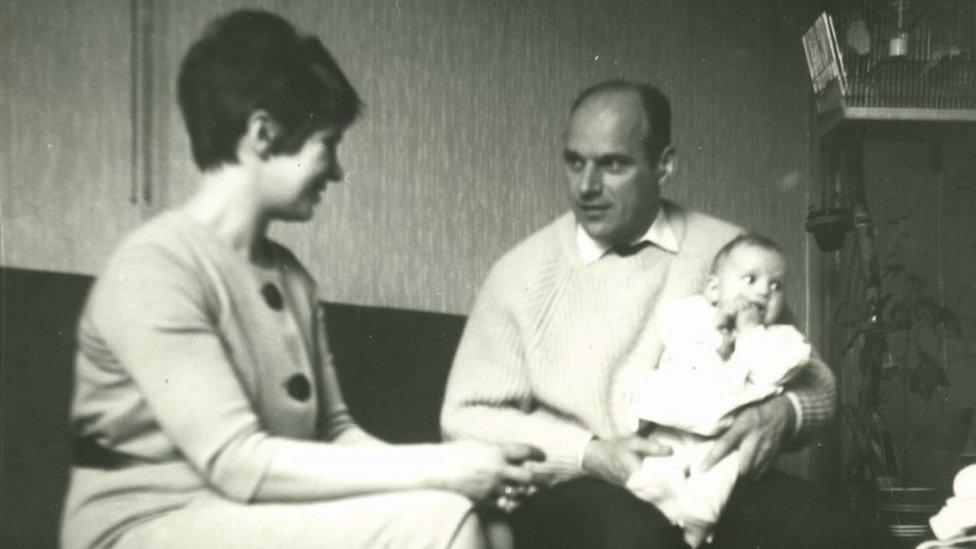
Astrid describes a childhood overshadowed by her father, Willem Sr, and his physical abuse of her mother
The youngest of four children, she was 17 when Heineken beer magnate Alfred "Freddy Heineken" and his driver, Ab Doderer, were whisked off the street at gunpoint in 1983.
Astrid's brother and his gang had moved from low-level drug deals and robberies to one of the most outrageous crimes in Dutch history.
"My father adored [Freddy Heineken]. Not in a normal way... like a stalker," she says. "So when he kidnapped Heineken that was probably the ultimate revenge on my father."
The hostages were chained for three weeks in specially constructed cells, until the Heineken family eventually paid a ransom of millions.
Holleeder and his friend Cor van Hout fled to Paris and, after a long legal saga, were extradited and sent to jail.
A life of celebrity
Prison didn't turn Holleeder into a pariah. On the contrary, he was given the nickname "cuddly criminal", even appearing on a popular talk show and posing for selfies on the streets.
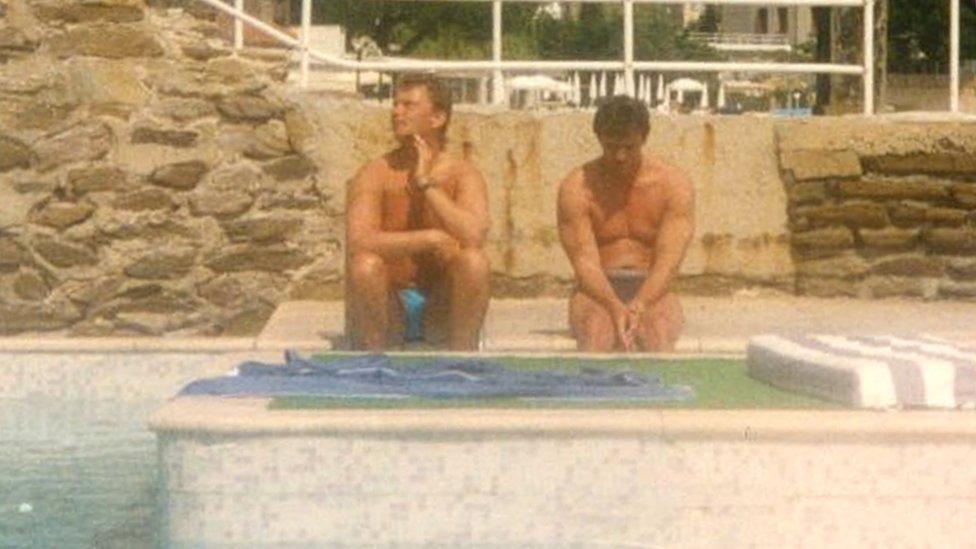
Willem Holleeder (R) and Cor van Hout served only half of their sentences for kidnapping Freddy Heineken
"It was amazing. Everyone wanted to be in a photo with him, celebrities wanted to pose with him. When he rode around on his scooter everyone was yelling at him, 'Willem, can I have your autograph?'"
Even when Willem Holleeder was sent back to jail for extortion in 2007, his image with the public did not change.
"It was frustrating because we knew the other side. He has two faces. But we couldn't blame the public, they didn't know because we were silent," says Astrid.
From convicted kidnapper to murder suspect
It was in January 2003 that Cor van Hout was shot dead at a restaurant near Amsterdam. It was the third attempt on his life in seven years.
Astrid Holleeder started to suspect her brother was behind the murder of his former partner in crime. Van Hout was her sister Sonja's former partner and father to Astrid's niece and nephew.
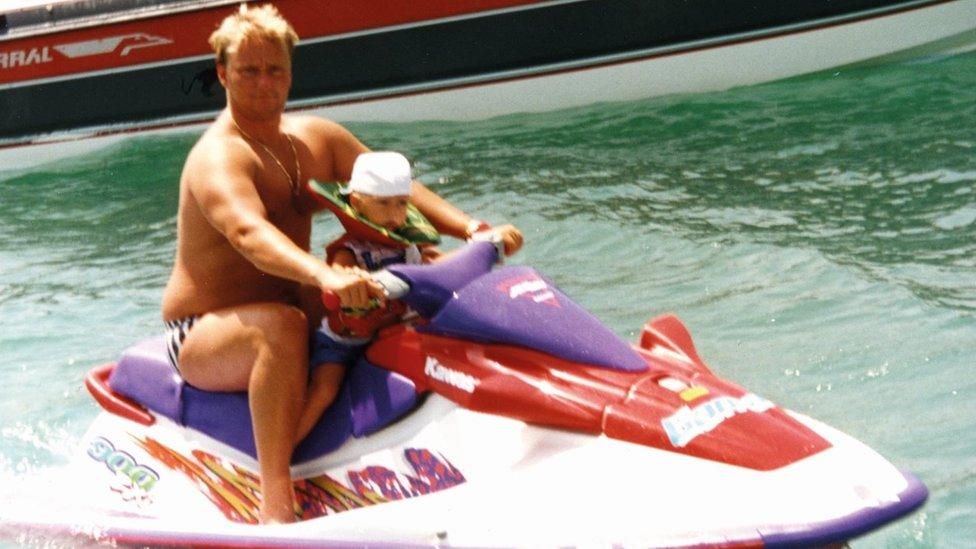
Cor van Hout survived two attempts on his life before he was shot dead in 2003
"Something had to happen to stop him."
As her brother's confidante and unofficial legal adviser, Astrid decided only she had the power to protect her family and have him put away.
"He is like a wild beast. It is a necessity to put him behind bars. It limits his possibilities."

Willem Holleeder: On trial for murder
Sam Klepper, criminal - shot dead, 2000
Cor van Hout, friend and ex-accomplice - shot dead, 2003
Willem Endstra, property developer - shot dead, 2004
John Mieremet, Klepper's business partner - shot dead in Thailand, 2005
Thomas van der Bijl, bar owner and family friend - shot dead, 2006
He is also accused of one count of manslaughter and two of attempted murder.
He denies the charges.

To ensure her betrayal paid off, Astrid went under cover.
She always feared the judges would be vulnerable to her charismatic sibling's capacity to charm.
"He knows how to manipulate people into believing him. If you talk to him for five minutes you like him, even though you know he committed a lot of crimes.
"After 10 minutes you don't believe what I've said about him anymore, after 15 minutes you think I'm crazy because he's fantastic.
"I had the same problem. Every time he wins my heart."
The only way to come up with compelling evidence, she concluded, was to wear a wire, without the help of Dutch authorities.
She had no trust in the justice department, as her brother had boasted that they were in his pocket.
She customised the recording devices in her bra and sewed them into collars. "He used to pat me down. I had to be careful he wouldn't see the red light flashing through my top, so I taped over them and coloured them in."
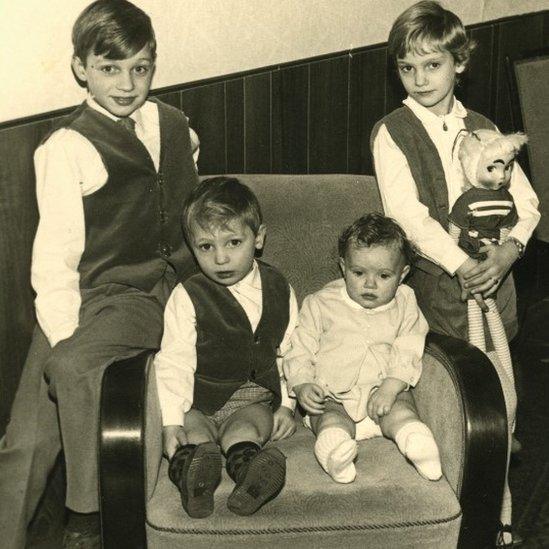
Willem (L) with his three siblings (L-R) Gerard, Astrid and Sonja

The explosive tapes recorded covertly by Astrid and her sister Sonja over two years were played in the high-security courtroom known as the bunker earlier this year, and formed a central part of the prosecution's case.
Willem Holleeder, 60, can be heard screaming eye-watering insults at Sonja, calling her a "cancer whore".
Reflecting on the courtroom drama, Astrid says: "It's not cool to treat a woman like that. A lot of people heard the tapes and decided, well, I'm not going to help him."
The vulgar, abusive language blew apart the image of a loveable rogue.
Joining the two sisters in giving evidence against him was his ex-partner Sandra den Hartog Klepper, who was also the widow of one his alleged victims.
'I don't want to be a hero'
Astrid Holleeder's autobiography Judas started out as a personal record for her daughter, popular TV chef Miljuschka, in case she didn't live long enough to tell her story.
But it has also made her wealthy.
Her brother told his trial: "My sisters are trying to trick you. They're lying and their only motive is money".
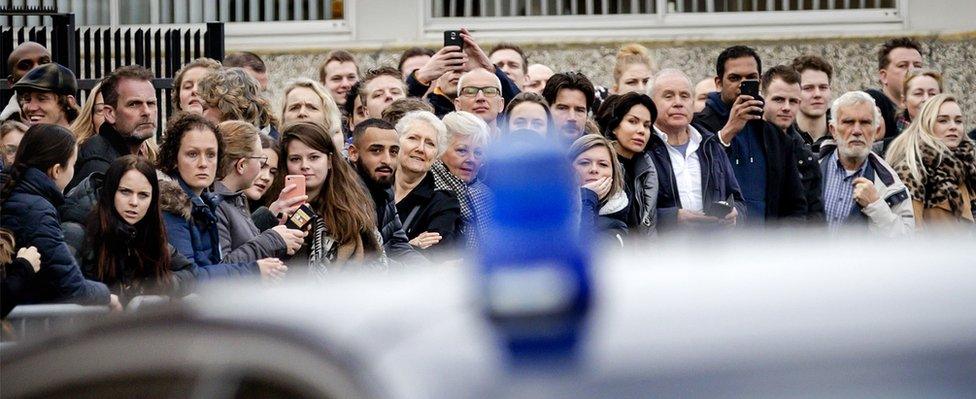
The events of the Holleeder trial have been followed by an absorbed Dutch public
Astrid wishes her brother could be locked away in a palace and accepts their fates will always be entwined.
"We're both sentenced to life if he gets convicted. If he doesn't get convicted, then we both have the death penalty because I think we have to kill each other."
But telling her life story was a liberation, sharing her words an opportunity to regain control.
"I'm not ashamed of the things I've done. I don't want to be a hero, or powerful. I just want to be me.
"I hope that people can see coming from a dysfunctional family doesn't mean you have to be crippled for life."
- Published10 May 2016
